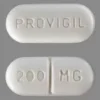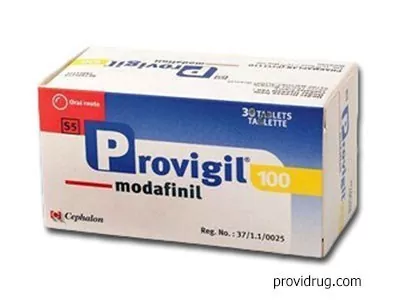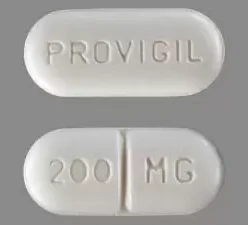$249.99 – $449.99
Provigil is available in a generic form called modafinil. The drug is used to that reduce daytime sleepiness in people with narcolepsy, obstructive sleep apnea, and shift work sleep disorder. Provigil 100 mg is used to treat sleepiness problems due to narcolepsy and sleep apnea. It helps the patient to sleep faster and longer.
Provigil is the brand name for the generic version of modafinil. This medication is a prescription medication that is FDA-approved to improve wakefulness in adults with excessive sleepiness including narcolepsy, obstructive sleep apnea (OSA), and shift work sleep disorder. In this way, Provigil 100 mg helps a person to stay awake during their office hours or for performing normal activities of the day and to have a normal sleep routine.
Strength And From Of Provigil:
The brand-name drug Provigil and the generic version may be available as oral tablets in different forms and strengths i.e. 100 mg, and 200 mg.
Provigil 100 mg: This capsule-shaped Provigil is a white to off-white, tablet imprinted with “PROVIGIL” on one side and “100 MG” on the other side.
Provigil 200 mg: The Provigil is capsule-shaped, an off-white, oblong, tablet debossed with “PROVIGIL” on one side and “200 MG” on the other.
Composition Of Provigil 100 mg & Its Works:
Provigil tablets contain 100 mg or 200 mg tablets. The following inactive ingredients: are croscarmellose sodium, lactose monohydrate, magnesium stearate, microcrystalline cellulose, povidone, and pregelatinized starch.
Provigil blocks dopamine transporters, the molecules that remove dopamine from brain synapses. It boosts the amount of dopamine in the brain i.e. a type of neurotransmitter and hormone. It plays a role in many important body functions, including movement, memory, and pleasurable reward and motivation.
High or low levels of dopamine are associated with several mental health and neurological diseases. The levels of chemical messengers in the brain exert a stimulant effect to reduce extreme sleepiness.
Provigil Is A Controlled Substance:
Provigil is a controlled substance that is classified as a schedule IV prescription drug. This means that it has an accepted medical use for physical or psychological dependence and may be abused. The government has established special rules for how scheduled IV drugs can be prescribed by a doctor.
How To Take Provigil 100 mg:
Read the Medication Guide provided by your doctor or pharmacist before you start using the white pill Provigil 100 mg. The doctor has prescribed for different patients in different ways.
For narcolepsy: Take this medication once in the morning. As directed by the doctor the medicine can take by mouth with or without food daily in the morning.
For obstructive sleep apnea: Usually, take this medication once daily in the morning by mouth with or without food as directed by your doctor. Continue your other treatment unless your doctor tells you to stop.
Shift work sleep disorder: Take it by mouth with or without food as directed by your doctor, usually once a day 1 hour before you start your work shift.
In this therapy you can take Provigil 100 mg with or without food, depending on your personal choice. You should not change your dose or take it at a different dose without telling to your doctor first. Avoid drinking alcohol, driving, and engaging in any dangerous activities while taking Provigil 100 mg.
The dosage is based on your medical condition and response to treatment. Take this medication regularly to get the most benefit from it. Contact your healthcare team or doctor if you ever have any questions about taking your medication or if you feel Provigil 100 mg not working anymore.
How Provigil 100 mg Works:
Provigil 100 mg is a wake-promoting Central Nervous System (CNS) medication. Provigil 100 mg may begin to work within 30 minutes of taking it and reaches peak blood levels within one to two hours.
This medication modulates the levels of chemical messengers in the brain and exerts a stimulant effect to reduce extreme sleepiness. It may affect areas in the brain that control wakefulness and attention.
Side Effects Of Provigil 100 mg:
According to the person’s physical and mental appearance such as age, gender, and height, the medication affects the patient.
Back pain, nausea, feeling nervous or anxious, stuffy nose, diarrhea, dizziness, indigestion, headache, nervousness, or difficulty sleeping may occur. If any of these effects last or get worse, tell your doctor promptly. Tell your doctor right away if you have any serious side effects, including fast/pounding/irregular heartbeat, mental/mood changes such as agitation, confusion, depression, hallucinations, and rare thoughts of suicide.
This is not a complete list of possible side effects. If you notice other effects not listed above, contact your doctor or pharmacist.
Addiction To the Medication:
Though Provigil 100 mg helps many people, this medication may sometimes cause addiction. This risk may be higher if you have it as overuse of or addiction to drugs/alcohol. Take this medication exactly as prescribed to lower the risk of addiction. Ask your doctor or pharmacist for more details about it.
Tell your doctor if your condition does not improve or if it worsens.
Withdrawal Medication:
If you suddenly stop using this medication, you may experience withdrawal symptoms such as shaking, poor concentration, tiredness or fatigue, low energy, depression, shortness of breath
sleepiness, sweating, chills, nausea, vomiting, and confusion. To help prevent these symptoms, your doctor may suggest you take to lower your dose slowly. Tell your doctor or pharmacist right away if you have withdrawal.
When this medication is used for a long time, it may not work as well. Talk with your doctor if this medication stops working well.
Interactions Between Provigil 100 mg & Other Medications:
Provigil may interact with certain medications or supplements. Always tell your doctor and pharmacist about any other medications or supplements including prescribed and unprescribed medications such as vitamins, and dietary or herbal supplements that you are currently taking. Sometimes this medication may interact with other medications or supplements and may cause an increased risk of certain side effects, but using both drugs may be the best treatment for you. The list below does not include all possible drug interactions with Provigil 100 mg. Please note that only the generic name of each medication is listed below.
- Avapritinib
- Axitinib
- Benzhydrocodone
- Cobimetinib
- Codeine
- Daclatasvir
- Ethynodiol
- Etonogestrel
- Grazoprevir
- Hydrocodone
- Ifosfamide
- Lorlatinib
- Lumateperone
- Methadone
- Neratinib
- Norgestrel
- Olaparib
- Oxycodone
- Pemigatinib
- Pretomanid
- Rimegepant
- Sufentanil
- Tacrolimus
- Ulipristal
- Velpatasvir
- Zanubrutinib
If both medicines are prescribed together, your doctor may change the dose or how often you use these medicines.
Provigil 100 mg Food Interactions:
Grapefruit and grapefruit juice may interact with this medication and lead to potentially dangerous effects. Tell your doctor about the use of grapefruit products.
Warning & Precaution:
To avoid danger to their health people should consult a pharmacist or doctor before they take prescription drugs. People who have chronic disorders should consult a pharmacist or doctor.
- This medicine is associated with an increased risk of death in certain patients. Please speak with your doctor about the benefits and risks of using this medicine.
- If you have a painful erection or an erection for more than 4 hours, seek medical care right away.
- Do not share this medicine with anyone who has not been prescribed this medicine.
- Always refill this medicine before it runs out.
- Tell your doctor if you are pregnant or breastfeeding, or if you have heart or blood vessel problems, including high blood pressure, heart rhythm problems, heart failure, a heart defect, or a history of heart attack or stroke. Tell your doctor if you have a history of seizures, depression, bipolar disorder, or mental health problems.
- Make sure your care providers know any medication allergies you may have.
- Know what to do if you miss a dose.
- Take your medicines at the right time(s).
- Keep Your Medications Safe
- When You are in the Hospital
- Identify yourself with the nurse before you take the given medications.
- Make sure your health care providers know all the medications you are taking.
- Know which medicines you will need to take once you leave the hospital.
- Make sure you got the right medicine from the pharmacy.
- Keep a list of all medications you take.
- Report unusual side effects.
- Ask if lower doses might be helpful depending on your age or any kidney or liver problems.
Provigil 100 mg should be avoided by those experiencing the following conditions:
- Hypertension
- Structural cardiac abnormalities
- Atherosclerosis
- Psychosis
- Anorexia
- History of epilepsy
- Tourette syndrome
- Individuals with a history of drug abuse
You should never take any medicine if you have the above health conditions. Do not start or stop any other medicines without speaking to your doctor or pharmacist.
| Quantity | 90 pills, 180 pills, 240 pills |
|---|
Related products
Provigil



